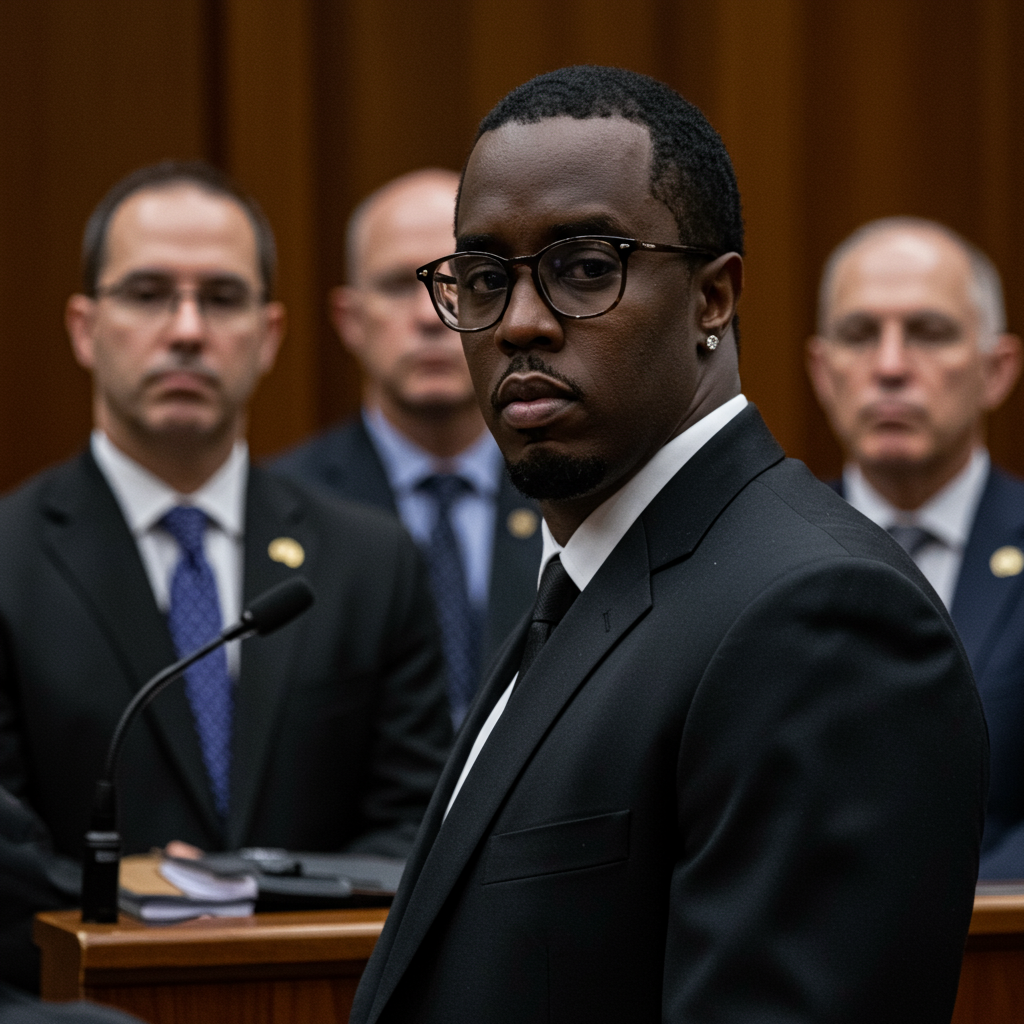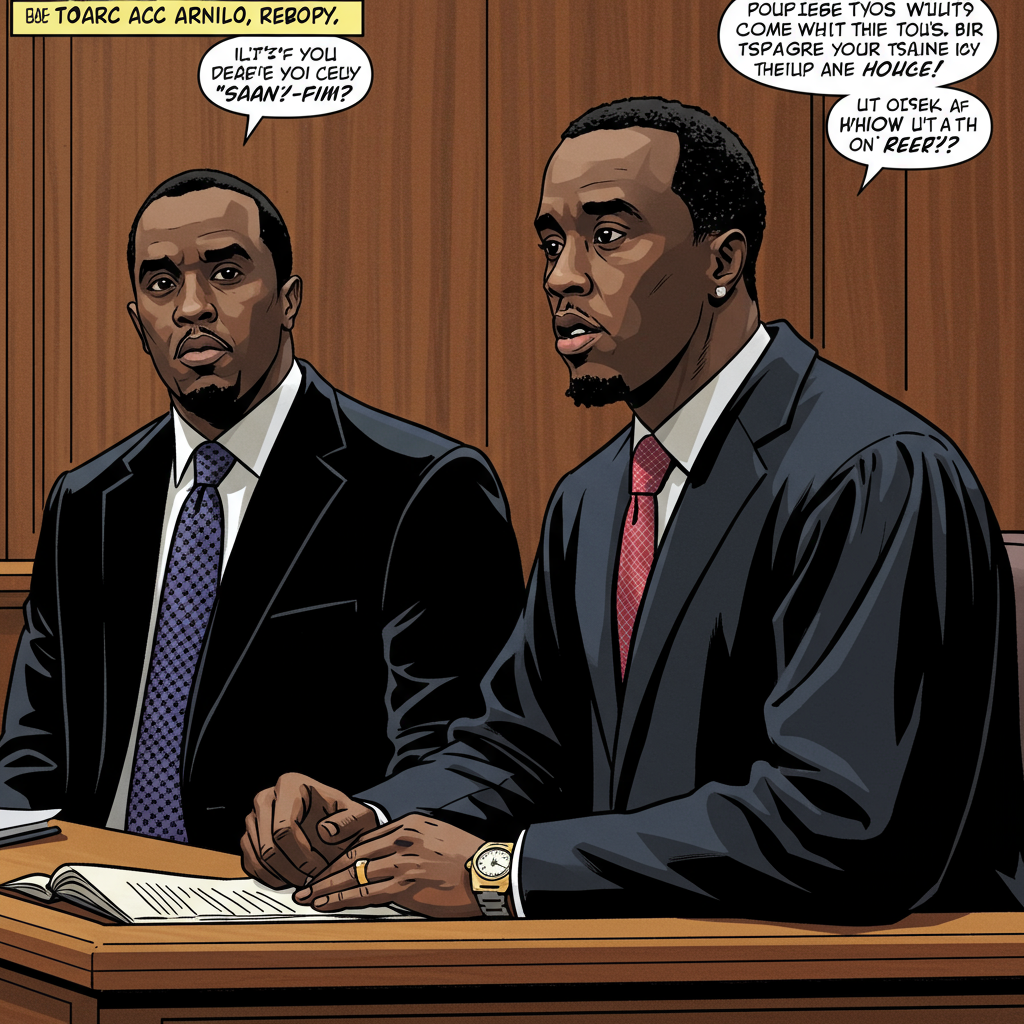The high-profile federal trial of Sean “Diddy” Combs has reached a critical stage, with the jury soon set to begin deliberations after hearing extensive testimony over more than six weeks. As the hip-hop mogul awaits a verdict on serious charges including racketeering conspiracy and sex trafficking, legal experts are weighing in on whether the prosecution successfully proved its case or if ample room for reasonable doubt remains.
Experts largely agree a conviction is far from guaranteed, citing specific vulnerabilities in the government’s presentation, particularly concerning the more complex charges. “This is not a walk in the park case; this is not a home run, at all,” commented trial attorney and legal analyst Misty Marris, highlighting the “technicalities” that could challenge the prosecution.
The Government’s Allegations
Federal prosecutors accuse Combs and members of his inner circle of operating a criminal enterprise. This alleged operation, they contend, used threats, violence, forced labor, and bribery to compel individuals, including former girlfriend Cassie Ventura and pseudonymous accuser “Jane,” to participate in sexual acts known as “Freak Offs” or “hotel nights.” The enterprise allegedly also worked to protect Combs’ reputation. These claims form the basis of the racketeering conspiracy charge.
Combs also faces two counts of sex trafficking related to Ventura and Jane, and two counts of transporting women and male escorts across state lines for prostitution. He has pleaded not guilty to all charges. If convicted of the most serious counts, he faces a potential sentence of 15 years to life in prison.
Proving the Enterprise: A RICO Challenge
Securing a conviction on the racketeering conspiracy charge is likely the prosecution’s most significant hurdle. Stemming from the RICO Act, designed to combat organized crime, this charge requires proving the existence of an “enterprise”—a group of people engaged in alleged misconduct—and that Combs and at least one other person committed at least two “predicate acts” (like transportation for prostitution, witness tampering, bribery, forced labor, or drug offenses) to further this enterprise within a 10-year period.
Legal analysts noted the novelty of applying RICO in this context and the inherent complexity. CNN legal analyst Joey Jackson questioned the core premise: “Was (Combs) running a criminal enterprise? Or was he running a legitimate, iconic business… and he was just a very flawed and broken person who was doing some personal things on his personal time?”
A key challenge for the prosecution, according to CNN anchor and chief legal analyst Laura Coates, is that Combs is the sole defendant charged, despite allegations of an enterprise involving employees and associates. Jurors did not hear direct testimony from many individuals described by prosecutors as part of the alleged enterprise, such as former chief of staff Kristina Khorram, who prosecutors called an “agent and co-conspirator” but did not testify. Coates believes this absence “does leave some room for a seed of doubt.” While prosecutors suggested employees facilitated alleged criminal acts by arranging travel or obtaining items, experts like Jackson point out the difficulty in proving employees were fully aware their actions were furthering a criminal enterprise versus simply following orders from a boss.
Sex Trafficking: Force, Fraud, or Coercion?
Convicting Combs on the sex trafficking charges requires proving he compelled Ventura and Jane into commercial sex acts through force, fraud, or coercion.
Evidence presented for Ventura included the widely publicized 2016 surveillance video showing Combs assaulting her, corroborated by testimony from Ventura and other witnesses about a pattern of physical violence throughout their 11-year relationship. Prosecutors used this, along with photos of injuries, to argue she was forced into “Freak Offs.” Financial coercion was also a factor: Ventura was signed to Combs’ label, giving him significant power over her career. Jane testified she was financially dependent on Combs via a “love contract” and was threatened with cutoff if she stopped “hotel nights.”
Marris considers the sex trafficking case stronger for Ventura due to the video evidence and career control. Additionally, Ventura testified Combs threatened to release explicit videos, leading her mother to wire money to Bad Boy Entertainment out of fear, though the money was later returned.
However, the defense presented significant counterpoints, primarily using the women’s own testimony and text messages. These communications sometimes showed Ventura expressing willingness (“I’m always ready to Freak Off lolol”) or enjoyment (“when we both want it”) early in the relationship, and Jane coordinating encounters or buying supplies. Though both women testified they were asked by Combs to make arrangements, the defense argued these texts undermined claims of coercion. Marris called the text messages “the star of the show” for the defense.
While prosecutors acknowledged the relationship might have been “toxic,” they argued domestic violence is not sex trafficking. A psychologist testified generally about abuse victims staying in relationships due to factors like financial dependence and difficulty seeking help, though she did not assess the victims in this case.
Significantly, legal experts have noted that the defense’s ability to argue “consent” is complicated by the racketeering charge, which encompasses alleged non-sex predicate acts like witness tampering, forced labor, and drug distribution. These allegations broaden the scope beyond just sexual encounters and make a simple consent defense challenging for the overall case. Experts also confirm that even if non-disclosure agreements existed as part of civil settlements, they would not prevent accusers like Ventura from being compelled to testify in a criminal trial via subpoena.
Transportation for Prostitution: The “Most Clear Cut” Charge
Experts generally view the two charges of transportation for the purposes of prostitution, based on the Mann Act, as the easiest for the prosecution to prove. This requires showing individuals crossed state lines with the intent to engage in prostitution.
Evidence supporting this includes testimony from Jane and Ventura detailing “hotel nights” and “Freak Offs” in various states (California, New York, Florida, Nevada) and internationally (Turks and Caicos). Ventura testified escorts participated in multi-state encounters and were paid cash afterward. This was backed by extensive documentary evidence presented in court, including flight records, hotel invoices, and American Express/bank statements tied to Combs, showing he paid for the travel and accommodations. Sexually explicit videos lining up with dates and locations further bolstered this evidence.
Jackson called this evidence “more clear cut,” with “names of the people,” “hotel records,” and confirmation they were “commercial sex workers or escorts.” The defense has countered by questioning whether payments were specifically for prostitution versus for time or entertainment.
The Defense Strategy: Focus on Reasonable Doubt
Combs’ defense team opted for a swift presentation, resting their case after only about 30 minutes and notably calling no witnesses, including Combs himself.
According to former federal prosecutor Mark D. Chutkow, this decision “makes sense,” particularly for a high-profile defendant like Combs. Not testifying avoids subjecting himself to potentially damaging cross-examination, where prosecutors could introduce even more evidence of alleged “bad acts” beyond what was already presented. Experts agreed that for the defense in a criminal trial, “less is more,” and not testifying minimizes risk. It also allows the defense to argue strongly in closing arguments that the prosecution failed to meet its burden of proving guilt beyond a reasonable doubt during its own case presentation. The defense can highlight evidence introduced through cross-examination or stipulation, which cannot be cross-examined further by the government.
The core theme of the defense throughout the trial has been that the accusations are a “money grab.” Coates noted the defense has framed the numerous civil lawsuits against Combs—including Ventura’s settled suit for $20 million and a friend’s suit for $10 million—as evidence of accusers’ financial motivations. As Coates summarized the defense theory, they have painted the case as “jealous money grabs – and kinky, not criminal.”
Looking Ahead
With the presentation of evidence concluded, the jury is now tasked with sifting through weeks of testimony and evidence to determine whether the prosecution successfully navigated the complexities of the charges and overcome the defense’s arguments for reasonable doubt. The verdict on whether Sean “Diddy” Combs will be held criminally accountable for the alleged enterprise activities and sex crimes rests entirely in their hands.



